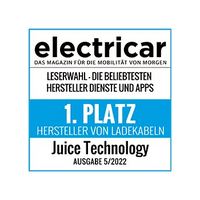Future matters and Juice Technology look ahead to the coming years
Lars Thomsen, futurologist and founder of the think tank "future matters" and board member of Juice Technology AG, provides a new insight into the current developments in the electromobility market. His conclusion: In just one year, every second newly registered car will be equipped with an electric motor. And: Grid-friendly charging is becoming increasingly important.
2023 was the year of change. The e-mobility market is becoming increasingly professional. While previously it was mainly private customers who bought electric vehicles, new growth segments are now emerging in company and fleet vehicles and in the commercial sector. These new market segments offer new manufacturers and charging technology specialists numerous new opportunities. Along with this, there are a number of new application scenarios that need to be covered and user requirements that need to be met.
Lars Thomsen predicts that the market share of electric vehicles will continue to grow progressively in 2024. Due to the market distortions, supply chain problems and energy price fluctuations of the last two years, the overall development is somewhat more cautious. However, the dampening effect triggered by rising interest rates and inflation is likely to have bottomed out. The wait-and-see attitude towards investments is still limited to individual regional sales markets and channels. Globally, electromobility is continuing to gain momentum.
Future matters only sees this development as being threatened if unfavorable political measures or intensive lobbying influence – for example from the oil and gas industry – aim to deliberately hinder or slow down electromobility.
Four trends for the years from 2024
In the near future, we can expect falling electricity prices and an increasing availability of variable electricity tariffs, which is due to the increase in the share of renewable energies in the electricity mix. This will further strengthen the advantage of electromobility over other forms of propulsion.
The share of electric vehicles (BEV and PHEV) in new registrations in Europe and the USA is therefore expected to grow to 50% by 2025 and to 80% by 2030. This trend is mainly driven by the increasing availability of BEVs at attractive prices from new Chinese and other Asian and US electric car manufacturers.
BEVs are also becoming increasingly important for commercial fleets. Their share of new registrations will rise from 10-15% to over 45% by the end of 2025. This trend, which covers all segments of corporate fleets - from company cars to commercial vehicles to rental cars - is based on environmental (ESG commitments and CO targets) and economic (cost savings through lower TCO) considerations. More than 400,000 new electric vehicles are expected to be added to rental and company car fleets alone over the next two years.
As a result of these developments, the market for charging infrastructure will grow strongly in the coming years. In particular, the demand for smart charging technologies with intelligent load management, which enable grid-friendly charging of electric vehicles, is now likely to increase very dynamically.













